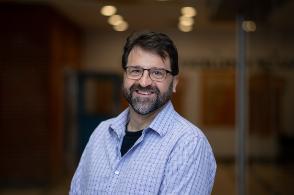Joseph Daraio

BS (SUNY-College of Environmental Science and Forestry), MS (New Mexico State University), MS (Rensselaer Polytechnic Institute), MS (University of Connecticut), PhD (University of Iowa), P.Eng.
Associate Professor
P.Eng.
Contact information
Ph: 709-864-2756
Em: jadaraio[at]mun.ca
Office: ER4017
Website: https://www.engr.mun.ca/CCRI/
Personal website
Dr. Daraio earned his PhD in civil and environmental engineering-hydraulics at the University of Iowa in 2009. He received his bachelor’s degree in forest and environmental biology from the SUNY, College of Environmental Science and Forestry (1991), and has masters’ degrees in biology (1994), philosophy (1998) and environmental engineering (2002). His primary interests lie in the potential impacts of climate change on storm water infrastructure and interdisciplinary research that links hydrology, hydraulics and ecology.
Prior to joining Memorial, he was an assistant professor of water resources engineering at Rowan University in New Jersey (2012-2015) where he worked on the potential impacts of climate change on local water resources. He also worked as a postdoctoral research scholar at North Carolina State University (contracted with the USGS in Reston, VA, 2010-2012), where he developed models to simulate the effects of land-use change and climate change on watershed hydrology and instream temperature to assess potential long-term effects on aquatic organisms. Joe has made significant contributions through his research in hydro-ecology and eco-hydraulics including model development, methodology, and how to use and integrate hydrodynamic and hydraulic models with biological models. He also worked as a hydraulic engineer on river restoration and dam removal projects with the US Bureau of Reclamation from 2002-2004.
Joe has also published work on climate change impacts using hydrologic simulations to assess potential response of stream flow, storm water related infrastructure, and is developing new methods with which to incorporate climate change uncertainty into infrastructure design. He is working with the Government of NL on a Natural Resources Canada (NRCan) funded project to build adaptive capacity through technical training of professional engineers in this area. The NRCan project provides a direct means of knowledge transfer of results from research to practise which has been done through a series of workshops held in St. John’s on Building Climate Resilience.